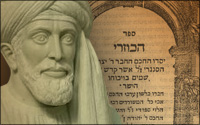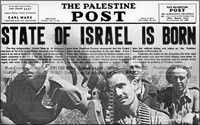 The greatness of the Jewish community in Spain during the Golden Age of the Jews in Spain is reflected in the lives of a number of great people. In general, history is extended biography. It is a narrative of the lives and events of people. In Jewish history especially, oftentimes by knowing the biography of certain people we are able to glimpse the society and times that they lived in and gain a more complete understanding of the historic process that they helped further.
The greatness of the Jewish community in Spain during the Golden Age of the Jews in Spain is reflected in the lives of a number of great people. In general, history is extended biography. It is a narrative of the lives and events of people. In Jewish history especially, oftentimes by knowing the biography of certain people we are able to glimpse the society and times that they lived in and gain a more complete understanding of the historic process that they helped further.
In this vein, let us discuss three of the greatest Jews during the Golden Age of Spain: Rabbi Solomon ibn Gabirol, Rabbi Judah Halevi and Rabbi Abraham ibn Ezra. We will devote an entire article to greatest of all, Rabbi Moses ben Maimon, Maimonides.
Rabbi Solomon ibn Gabirol
Rabbi Solomon ibn Gabirol was born in approximately 1021 CE. We know very little about him. We know that he was orphaned at a very early age and died at an early age, perhaps 27 or 35.
He was a person of enormous intellect who knew many languages: Latin, Greek, Arabic and Hebrew, as well as different dialects of what now is Spanish. He is considered one of the primary poets in Jewish history, and wrote them both in Arabic and Hebrew. He wrote hundreds of poems on all sorts of topics: weddings, nature, life, relationships, marriage, etc.
What he is remembered for among the Jews is his religious poetry. There is one particular poem that stands out above the others, “The Crown of Sovereignty” (Kesser Malchus). It is recited till today on Yom Kippur night by Sephardic Jews.
The poem, a few hundred stanzas long, is a magnificent description of God, man, the people of Israel and the Torah. It is the poem of Jewish literature. No other poem captures the essence of the soul of the Jewish people and humanity.
It describes how he intends to appear before God for judgment, how he sets up his army, his defense: “I have established my battlefront and arranged my soldiers.” Then he describes how when he comes closer to the Day of Judgment he realizes that he cannot rely on his soldiers and his strategy may not work. In other words, he realizes the weaknesses of man.
The end is that he comes before God without anything. His army is dispersed. His weapons have fallen. His courage is gone. Psychologically, it is not easy to take a hard look at oneself in the mirror. One who is stripped of all defenses and illusions sees a different picture of himself.
“The Crown of Sovereignty” is a masterpiece to all masterpieces. His breadth of knowledge from the Talmud and philosophy is remarkable. How he describes life and the things that happen to us in life; the frustration and futility of death; the questions of Job, etc. It is a towering accomplishment. Unfortunately, it does not have the wide popularity that it should have.
All later Jewish poets borrowed from ibn Gabirol – both his style and ideas.
Rabbi Judah Halevi
Rabbi Judah Halevi was born in 1085 and died in 1141 CE. He became the poet laureate of the Jewish people. But as great as that accomplishment was, he was much more than that.
His entire life he longed to live in the land of Israel. At the end of his life, when he was in his sixties, he finally embarked upon that fateful journey. There is a famous series of poems he wrote called, “The Poems of the Sea,” which were the poems he write while he was on the boat. His end is shrouded in legend. When he finally came to the gates of Jerusalem and bowed down to kiss the earth of the holy city he was killed by a Bedouin Arab bandit that took him by surprise. That is the legend. That fact that he died in the land of Israel is known fact, although his burial place is not known.
But he expressed more than anyone else in his time the longing of the Jewish people to return to Zion. That is important to bear in mind because at the height of the Golden Age of Spain one might logically assume that the Jews were satisfied there. Rabbi Judah Halevi therefore came to declare that the Jews of Spain had no intention of viewing Spain as their permanent homeland. He expressed the longing of the Jews for an end of the exile and a return to Zion.
The Kuzari
Rabbi Judah Halevi was a prolific poet. Indeed, he is the poet of the Jewish people. Aside from his poetry, though, he was also a great philosopher. His famous book, written in Arabic and later translated later into Hebrew, is called, “The Kuzari,” and is based on the story of the Khazars, the kingdom in central, Asiatic Russia who converted and became Jews. Through the words of the Jewish wise man presenting Judaism to the Khazar king, Rabbi Judah Halevi portrays the ideas of Judaism to the world.
There are certain ideas presented in the book that since his time has remained the basic philosophy of the people of Israel. One of them is the idea of consensus omnia, meaning “everyone agrees.” He points out, indeed, that all three religions agree on the divinity of the Torah, Moses, Mount Sinai, that the Jewish people were at one time at least the Chosen People, etc. The dispute comes later. The consensus omnia, therefore, is that the origins of the Torah and the Jewish people are true. If each of the monotheistic religions agree that the Torah was given on Sinai, that Moses was a holy man, that the Jewish people were a special people, etc. it is logical to believe in it. The burden of proof is therefore upon those who claim that there was a “new” testament (Christianity) or a “final” revelation (Islam). If it cannot be proven, then the reasonable thing is to stay with the consensus omnia, i.e. that which is not in dispute.
Another major philosophic point he makes is that civilization is tied up with the lot of the Jewish people. All advances and reverses in civilization somehow are either Jewish in origin or they impinge upon the Jewish people specifically rather than upon other nations. In a prediction regarding European and world history, Rabbi Judah Halevi says that the relationship of governments and empires to the Jewish people is the barometer by which civilization will be measured. If the Jewish people come to redemption in their own land and the world accepts it then that will be the messianic era for the rest of the world. However, as long as the Jewish people have not found rest there, then the remainder of the world will be troubled.
This idea that the salvation of the world is dependent upon the Jewish people has been taken up by the Southern Baptists and other fundamentalist Christian sects. That is why they are ardent Zionists, even more so than many Jews. Of course, they added to it the belief that after State of Israel is established it will somehow convert to Christianity and lead to the Second Coming, etc. (When that does not happen they will probably become less Zionistic than they are now.) But this idea is rooted in the Kuzari, which has had a lasting effect on all subsequent Jewish generations.
One of the things we see from the Kuzari is that already in Rabbi Judah Halevi’s time Jews were forced to defend their faith against Muslims and Christians. Therefore, Rabbi Judah Halevi’s time, roughly the 1100s, marks the turning point of the Golden Age. Jews will increasingly feel obligated to justify Judaism to outsiders. Such justification will take on stronger and stronger overtones until by the end of Spanish Jewry the Jews will be engaged full time in defending and explaining Judaism.
Rabbi Abraham ibn Ezra
Rabbi Abraham ibn Ezra, born in 1093 CE, was a contemporary of Rabbi Judah Halevi. He died in 1167 CE. In terms of personal life, he is one of the most tragic figures in Jewish history and writes about his tragic life in one of his famous poems. He wrote, for instance, that if he was a maker of funeral shrouds the Angel of Death would quit.
“The ibn Ezra,” as he is commonly called, was born in the city of Toledo in Spain. The city was captured by Christians when he was a young man. This was the beginning of the time that would be called the Christian Reconquest of Spain. He fled and wandered throughout the civilized world for most of the next 50 years. He was in London, Paris, Italy, North Africa, etc. Financially, he never was successful. He also experienced terrible family tragedies. Three of his sons died during his lifetime. His fourth son, in whom he had put great hopes, eventually converted to Islam. The father spent two years trying to bring him back to Judaism and failed. Eventually, he wrote an elegy over his son, Isaac, who converted. (Isaac converted because he received an attractive appointment in Baghdad.)
Aside from his great poems, his commentary on the Torah is one of the great jewels of Jewish scholarship. In this commentary, the ibn Ezra’s greatness is readily apparent through his command of language and tradition, as well as his powerful beliefs despite the tragedies in his life. The same mastery can be seen in his commentary to the entire Tanach, which is also extant today. The ibn Ezra is almost the dying ember of the Golden Age of Spain. In his work, one senses that the times are changing and that the preferential position of the Jews in Spain would not continue indefinitely. Spanish Jewry was now facing problems that it would not find easy to overcome.
In summary, a review of the lives of these three people and their contributions gives us a clear picture of what the Golden Age of Spain was like at its zenith. From this time on the situation of the Jews will change and change because of three factors. First, Muslim fanaticism will now return. Second, the Christians are going to reconquer Spain and the Christian attitude toward the Jews will change radically. Third, the combination of assimilation and the worsening of the situation will cause the Spanish Jews to rethink their preoccupation with poetry, philosophy, language, etc. There will arise within Spanish Jewry itself a reaction that will say the situation is becoming worse due to the fact that they have forsaken the Torah and been too interested in other things which are not intrinsically Jewish, and unless we return to our roots we are going to be destroyed.
All three factors will become even more evident in the leg on this journey through Jewish history, the story of Maimonides.











